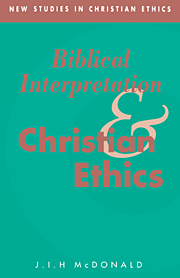Introduction: Relating the Bible to Christian ethics
Published online by Cambridge University Press: 22 September 2009
Summary
As drink is pleasant to them that be dry, and meat to them that be hungry; so is the reading, hearing, searching, and studying of Holy Scripture, to them that be desirous to know God, or themselves, and to do his will.
One of the more rewarding features of the current academic scene is the growth of interdisciplinary studies. As the above quotation shows, the Reformation viewed interpretation, theology, self-understanding and ethics as part of an organic whole, an integrated movement in the divine—human symphony. It is only in recent times that ‘biblical interpretation’ has reemerged as an attempt to co-ordinate and interrelate a variety of disciplines accustomed to operate with a jealous regard for their independence: textual study, exegesis, theology, history, hermeneutics, ethics… Whereas the legacy of the Enlightenment was fragmentation into separate disciplines, detailed attention is now being given to the process of reading texts, which involves many disciplines. Diplomatic relations have been re-established also with the world of literature. Results are already impressive. ‘In the waning years of the twentieth century, and at the heights (or depths) of secularisation, the Bible is being reaffirmed and re-examined as one of Western literature's greatest texts.’
Ethics has resurfaced in hermeneutical debate. Prominence has been given, for example, to the ethics of biblical interpretation, and new studies have been made of ethics in the Hebrew scriptures and the New Testament.
- Type
- Chapter
- Information
- Biblical Interpretation and Christian Ethics , pp. 1 - 8Publisher: Cambridge University PressPrint publication year: 1993



